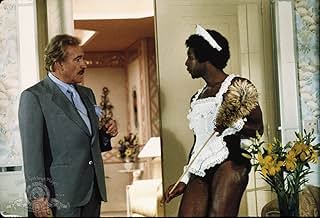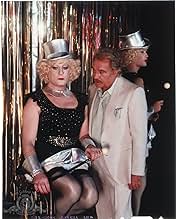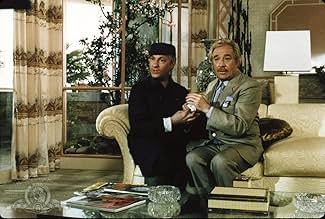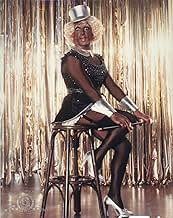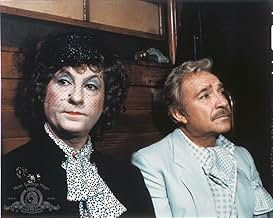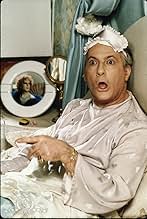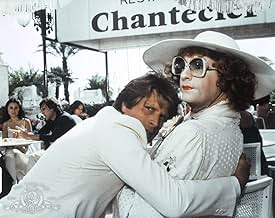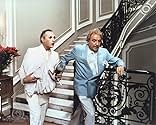IMDb-BEWERTUNG
5,8/10
2333
IHRE BEWERTUNG
Füge eine Handlung in deiner Sprache hinzuThe titular gay couple become involved with local cops and foreign spies when one of them unwittingly obtains a roll of stolen microfilm.The titular gay couple become involved with local cops and foreign spies when one of them unwittingly obtains a roll of stolen microfilm.The titular gay couple become involved with local cops and foreign spies when one of them unwittingly obtains a roll of stolen microfilm.
- Auszeichnungen
- 1 Nominierung insgesamt
Nello Pazzafini
- Mangin
- (as Giovanni Pazzafini)
Empfohlene Bewertungen
This movie is worth a look, even though it lacks the same spark as its supremely hilarious predecessor.
(N.B., Michel Serrault who plays Albin in the La Cage movies plays the equally fey hairdresser in "The King of Hearts" starring Alan Bates)
(N.B., Michel Serrault who plays Albin in the La Cage movies plays the equally fey hairdresser in "The King of Hearts" starring Alan Bates)
It's not lost on me that the very premise embraces the familiar pattern for sequels of going off the rails and throwing established characters into an even more far-fetched scenario just for kicks. And that's okay! Not every movie can pull off that free-wheeling "anything goes" spirit, but one kind of has to admire the gumption to do it in the first place, and when it works, it works. One way or another, why shouldn't gay couple Renato and Albin, the latter a drag queen at the famous titular nightclub, get themselves involved in a plot of state secrets, assassins, and international intrigue? With filmmaker Édouard Molinaro returning from the preceding picture, and the same writing team, not to mention the same principal stars (and editors, and cinematographer - and composer Ennio Morricone), all the major pieces are in place to make this farce the best that it could be. To be sure, Ugo Tognazzi and Michel Serrault bring the same marvelous energy to their portrayals of Renato and Albin, and Benny Luke as Jacob; at its best this unquestionably illustrates the same skill, intelligence, and cleverness that made its predecessor such a success. However, I also don't think there's much arguing that 'La cage aux folles II' is a distinctly lesser creation, and it's not a big surprise that while the 1978 film got remade in the United States in 1996 as 'The birdcage,' this 1980 follow-up is virtually unknown.
At its best we get outrageous scene writing, spirited characters and commensurate performances, sharp dialogue, and all the excellence we'd assume of the name, Roman numerals or not. To that, add some splendid stunts and effects in keeping with the premise. 'II' definitely earns some laughs. Yet where in the first film the grand hilarity was paired with gratifying earnestness in the storytelling, we get nothing more than faint glimmer, here, of the latter. And hey, in that this means augmenting the farce, there's nothing inherently wrong with that. However, in place of sincerity, what we often get instead in this case feels like a level of cruelty in the writing exceeding the base prejudice with which in-law Simon Charrier was written the first time around. There are elements here of homophobia, fatphobia, ageism, and otherwise ugly condescension, gawking, dehumanization, and nastiness - in the dialogue, in how Renato and Albin are written, and in how others react to them - that feel less like 'La cage aux folles' and more like 'American History X.' More infrequently does the heart shine through, and the best cleverness; more commonly, it almost comes across that this sequel is just punching down to laugh at rather than with the queer community that it celebrated two years before.
Don't take my harsh words to suggest that this picture is bad, because that's certainly not true. I really did have a good time watching! Both as an absurd continuation of the saga of renato and Albin, and as an oblique variation on the Euro spy comedy, I'd be lying if I said this wasn't fun. But the entertainment just isn't as strong as it was before; there are even a couple points where the writing seems a tad forced, as if writers Marcello Danon, Jean Poiret, and Francis Veber were themselves struggling to make the assemblage work even on paper. By and large it's better than not, including superb filming locations, production design, costume design, and hair and makekup. I appreciate Morricone's score, Armando Nannuzzi's cinematography, and Molinaro's direction. Some moments are downright brilliant. The fact remains that anyone hoping for a genuine successor to what 'La cage aux folles' gave us are apt to be disappointed; as much as I do like this, I wonder if I'm not being too kind in my assessment. In any event, no matter how you slice it this is overall decent, and there are certainly worse ways to spend one's time. 'II' isn't an essential classic like 'I' is, and in some ways it's pointedly weaker - but if you can get on board with the abject frivolousness, it's still worthwhile on its own merits if you happen to come across it.
At its best we get outrageous scene writing, spirited characters and commensurate performances, sharp dialogue, and all the excellence we'd assume of the name, Roman numerals or not. To that, add some splendid stunts and effects in keeping with the premise. 'II' definitely earns some laughs. Yet where in the first film the grand hilarity was paired with gratifying earnestness in the storytelling, we get nothing more than faint glimmer, here, of the latter. And hey, in that this means augmenting the farce, there's nothing inherently wrong with that. However, in place of sincerity, what we often get instead in this case feels like a level of cruelty in the writing exceeding the base prejudice with which in-law Simon Charrier was written the first time around. There are elements here of homophobia, fatphobia, ageism, and otherwise ugly condescension, gawking, dehumanization, and nastiness - in the dialogue, in how Renato and Albin are written, and in how others react to them - that feel less like 'La cage aux folles' and more like 'American History X.' More infrequently does the heart shine through, and the best cleverness; more commonly, it almost comes across that this sequel is just punching down to laugh at rather than with the queer community that it celebrated two years before.
Don't take my harsh words to suggest that this picture is bad, because that's certainly not true. I really did have a good time watching! Both as an absurd continuation of the saga of renato and Albin, and as an oblique variation on the Euro spy comedy, I'd be lying if I said this wasn't fun. But the entertainment just isn't as strong as it was before; there are even a couple points where the writing seems a tad forced, as if writers Marcello Danon, Jean Poiret, and Francis Veber were themselves struggling to make the assemblage work even on paper. By and large it's better than not, including superb filming locations, production design, costume design, and hair and makekup. I appreciate Morricone's score, Armando Nannuzzi's cinematography, and Molinaro's direction. Some moments are downright brilliant. The fact remains that anyone hoping for a genuine successor to what 'La cage aux folles' gave us are apt to be disappointed; as much as I do like this, I wonder if I'm not being too kind in my assessment. In any event, no matter how you slice it this is overall decent, and there are certainly worse ways to spend one's time. 'II' isn't an essential classic like 'I' is, and in some ways it's pointedly weaker - but if you can get on board with the abject frivolousness, it's still worthwhile on its own merits if you happen to come across it.
I love this movie, the scenery, the music etc...
But old foreign movie critic friend of mine back in the early '80s suggested to me that Michel playing the haggard Italian lady was a salute to Ana Magnani. I've seena few movies of her. And Michel really did a great job.
I'm from Avellino Italy and I came over in 1956. So. In our Italian American villages we didn't have running water so we had to pump the drinking water and have rain barrels around our houses to save it for washing clothes. It was great for your hair too.
My Italian grandmother and mother would act like him when they were toiling with their chores.
I'm from Avellino Italy and I came over in 1956. So. In our Italian American villages we didn't have running water so we had to pump the drinking water and have rain barrels around our houses to save it for washing clothes. It was great for your hair too.
My Italian grandmother and mother would act like him when they were toiling with their chores.
I am not purposely skipped the first installment, just by coincidence, I could only found the sequel right now, soothingly enough, the omission itself does not spoil the fun of this French slapstick comedy made more than 30 years ago.
How many times one could laugh out loud watching a gay/transvestite film from beginning till the very end? What's more precious is without being tainted by vulgar gags sand abominable antics (especially immune of sex-relating perversions or individual sex- orientation humiliations).
Plot-wise, although devoid of certain logistics, everything serves up to the middle-age crisis in this gay-relationship, particularly the deterioration of Zaza Napoli's self-confidence (a remarkable performance from the late Michel Serrault), which wisely puts audience into a heartfelt milieu whereas the entire "mini-film case" merely functions as a backdrop, there is no worries about our protagonists' personal security, the only gory murder is underplayed by a poison-dart.
The odd-couple route stews in a series of set pieces which strive on the verge of platitude, yet the acting, literally Michel Serrault, does single-handedly overturns the unfavorable condition, also who could forget Benny Luke's transvestite black servant (who changes his dresses in each scene), whilst in the latter returning-to-Italy part, the contradiction is pure simple but effective, which leavens the situation into a more culturally universal understanding. Enrico Morricone's score also is a big selling-point for the film
Overall, this super-optimistic farce (I suppose it includes the entire series, there are three films in all) could easily outshines among myriads of melodramatic-sentimental gay genre films even they were made several dozens of years ahead.
How many times one could laugh out loud watching a gay/transvestite film from beginning till the very end? What's more precious is without being tainted by vulgar gags sand abominable antics (especially immune of sex-relating perversions or individual sex- orientation humiliations).
Plot-wise, although devoid of certain logistics, everything serves up to the middle-age crisis in this gay-relationship, particularly the deterioration of Zaza Napoli's self-confidence (a remarkable performance from the late Michel Serrault), which wisely puts audience into a heartfelt milieu whereas the entire "mini-film case" merely functions as a backdrop, there is no worries about our protagonists' personal security, the only gory murder is underplayed by a poison-dart.
The odd-couple route stews in a series of set pieces which strive on the verge of platitude, yet the acting, literally Michel Serrault, does single-handedly overturns the unfavorable condition, also who could forget Benny Luke's transvestite black servant (who changes his dresses in each scene), whilst in the latter returning-to-Italy part, the contradiction is pure simple but effective, which leavens the situation into a more culturally universal understanding. Enrico Morricone's score also is a big selling-point for the film
Overall, this super-optimistic farce (I suppose it includes the entire series, there are three films in all) could easily outshines among myriads of melodramatic-sentimental gay genre films even they were made several dozens of years ahead.
Gay couple Albin (Michael Serrault) and Renato (Ugo Tognazzi) get involved with the police and gangsters when Albin gets some stolen microfilm. They flee to Italy and try to hide out.
This isn't as good as the original (which was ground breaking) but it's a hundred times better than part 3 (which was dreadful). The plot is silly but when Albin and Renato are on screen who cares? The two actors are great in their roles. There's plenty of funny sequences especially when all the policemen dress up in drag! So it's worth seeing but don't expect it to be as good as the original. BTW--ignore the R rating. It's PG-13 all the way.
This isn't as good as the original (which was ground breaking) but it's a hundred times better than part 3 (which was dreadful). The plot is silly but when Albin and Renato are on screen who cares? The two actors are great in their roles. There's plenty of funny sequences especially when all the policemen dress up in drag! So it's worth seeing but don't expect it to be as good as the original. BTW--ignore the R rating. It's PG-13 all the way.
Wusstest du schon
- WissenswertesRenato's son - Laurent, whom had a prominent role in the first part, is only briefly mentioned and not featured at all.
- PatzerAlbin's mysterious voyeur gets shot in the neck, from the balcony that's placed closely beneath him, whilst Albin himself upholds a straight face-to-face contact with him the whole time and somehow, still remains oblivious to the fact shortly after it happened.
Top-Auswahl
Melde dich zum Bewerten an und greife auf die Watchlist für personalisierte Empfehlungen zu.
- How long is La Cage aux Folles II?Powered by Alexa
Details
- Erscheinungsdatum
- Herkunftsländer
- Sprache
- Auch bekannt als
- La Cage aux Folles II
- Drehorte
- Via Marcello Malpighi 9, Rom, Latium, Italien(Hotel Des Lys)
- Produktionsfirmen
- Weitere beteiligte Unternehmen bei IMDbPro anzeigen
Box Office
- Bruttoertrag in den USA und Kanada
- 6.950.125 $
- Weltweiter Bruttoertrag
- 6.950.125 $
- Laufzeit1 Stunde 31 Minuten
- Sound-Mix
- Seitenverhältnis
- 1.66 : 1
Zu dieser Seite beitragen
Bearbeitung vorschlagen oder fehlenden Inhalt hinzufügen

Oberste Lücke
By what name was Noch ein Käfig voller Narren (1980) officially released in Canada in English?
Antwort

